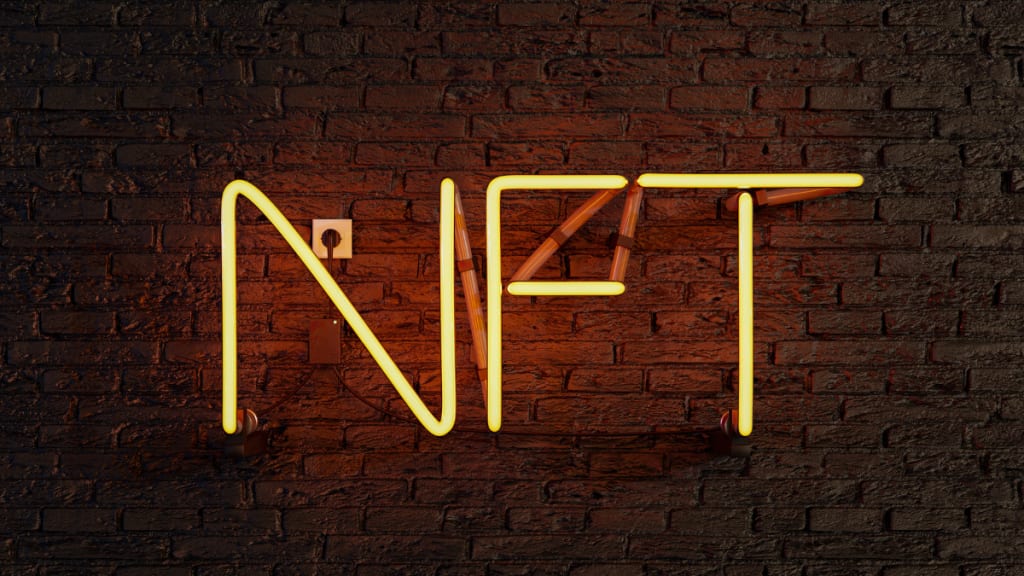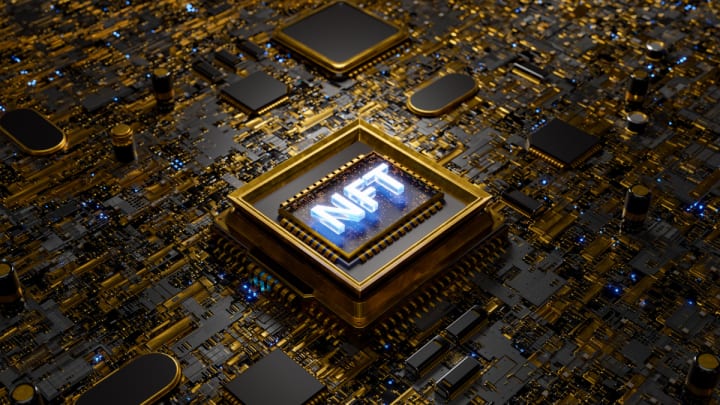The Next-Gen of Exchange: NFT Marketplace Development Services
NFT Marketplace Development Services

In the ever-evolving landscape of blockchain technology and digital assets, Non-Fungible Tokens (NFTs) have emerged as a revolutionary concept. NFT marketplace development services play a pivotal role in shaping the next generation of exchange platforms. These services encompass the design, creation, and implementation of cutting-edge marketplaces that cater to the diverse needs of NFT creators and collectors. From user-friendly interfaces to robust security measures and smart contract integration, NFT marketplace development services are at the forefront of empowering artists and businesses to embrace this burgeoning digital frontier.With a surge in NFT adoption, the demand for advanced, secure, and feature-rich NFT marketplaces has never been higher. This article explores the significance of "NFT marketplace development services" in driving the NFT revolution, highlighting the key elements that make these platforms the preferred destination for NFT enthusiasts, and shedding light on the limitless potential of NFTs in reshaping the future of digital exchange.
Introduction to NFTs and NFT Marketplaces
In recent years, Non-Fungible Tokens (NFTs) have taken the digital world by storm. NFTs are unique digital assets that represent ownership of a specific item, artwork, collectible, or virtual real estate. Each NFT is indivisible and cannot be replicated, making it one-of-a-kind on the blockchain. With this revolutionary concept, NFTs have transformed how we perceive and exchange digital ownership.
NFT Marketplaces serve as platforms that enable users to buy, sell, and trade NFTs securely and efficiently. These marketplaces have emerged as the next generation of exchange, revolutionizing the art, gaming, music, and real estate industries.
Understanding the Next-Gen of Exchange
Traditional exchanges have primarily dealt with fungible assets, such as stocks, currencies, and commodities. However, NFTs have introduced a paradigm shift by enabling the exchange of unique, non-replicable digital assets. This new concept has unlocked various opportunities for creators, artists, and investors to monetize and trade their digital creations, leading to the rise of NFT marketplaces.
Benefits of NFT Marketplace Development Services
NFT marketplace development services offer a wide array of benefits for creators, artists, businesses, and investors involved in the NFT space. Some of the key advantages include:
- Customized Platforms: NFT marketplace development services create tailored platforms that cater to the unique needs of creators and collectors. These platforms are designed with user-friendly interfaces, intuitive navigation, and seamless interactions, enhancing the overall user experience.
- Security and Trust: Security is paramount in the NFT ecosystem. Professional development services implement robust security measures and smart contract integration, ensuring the authenticity, ownership, and provenance of NFTs, which builds trust among participants.
- Market Exposure: NFT marketplace development services provide a centralized hub for showcasing NFTs to a global audience. This exposure increases the visibility and accessibility of digital assets, attracting potential buyers and investors from various backgrounds.
- Efficient Transactions: The development of efficient and reliable transaction mechanisms streamlines the buying, selling, and trading of NFTs. This seamless process reduces transaction times, minimizes fees, and enhances liquidity within the marketplace.
- Community Engagement: NFT marketplaces act as vibrant communities, fostering interaction and engagement between creators and their audience. These platforms provide social features, forums, and chat functionalities that facilitate community building and communication.
- Smart Contract Integration: NFT marketplace development services leverage smart contracts to automate processes, ensuring secure, transparent, and immutable transactions. Smart contracts enable the implementation of royalties, licensing terms, and other customizable features.
- Incentivization Mechanisms: NFT marketplaces often employ incentivization mechanisms such as gamification, rewards, and loyalty programs. These features encourage active participation, promoting the growth and sustainability of the platform.
- Data Analytics and Insights: Professional development services utilize data analytics to gather valuable insights into user behavior, preferences, and market trends. This data-driven approach enables platform operators to make informed decisions and optimize strategies.
- Scalability and Flexibility: NFT marketplace development services create scalable platforms that can accommodate increasing demand and adapt to evolving market trends. This flexibility ensures the platform's longevity and relevance in the dynamic NFT space.
- Regulatory Compliance: By adhering to legal and regulatory requirements, NFT marketplace development services instill confidence among users, ensuring that the platform operates within the bounds of the law.
Exploring the NFT Marketplace Ecosystem
The NFT marketplace ecosystem is a dynamic and rapidly evolving landscape that has transformed the way digital assets are bought, sold, and owned. At its core, NFTs (Non-Fungible Tokens) are unique cryptographic tokens that represent ownership of distinct digital items, ranging from art, music, and videos to virtual real estate and virtual goods in gaming. These one-of-a-kind tokens operate on blockchain technology, ensuring secure ownership, provenance, and authenticity. NFT marketplaces serve as the central hubs where NFTs are listed, showcased, and traded, connecting creators with buyers and collectors worldwide. As demand for NFTs has skyrocketed, an array of NFT marketplaces has emerged, each with its own set of features, user interfaces, and community engagement tools. These platforms facilitate community-building, enabling creators and enthusiasts to interact, share their passion, and engage in the NFT ecosystem. With an ever-expanding array of NFT projects and innovations, the NFT marketplace ecosystem continues to redefine digital ownership, empowering creators, revolutionizing industries, and reshaping the future of exchange in the digital age.
Key Components of NFT Marketplace Development
NFT marketplace development involves several key components that come together to create a functional and user-friendly platform. Some of the essential components include:
- Smart Contracts: Smart contracts are the backbone of NFT marketplaces. They are self-executing code that automates the process of creating, buying, selling, and transferring NFTs securely and transparently on the blockchain.
- User Authentication and Security: Robust user authentication and security measures are critical to protect user accounts and sensitive data. This includes encryption, two-factor authentication, and other security protocols.
- User Interface (UI) and User Experience (UX): An intuitive and visually appealing user interface enhances the user experience, making it easy for creators and collectors to navigate the platform, list NFTs, and engage with the community.
- NFT Minting and Listing: The platform should provide a simple and straightforward process for creators to mint and list their NFTs, including options to upload metadata, images, and set royalties.
- Wallet Integration: Integration with cryptocurrency wallets allows users to manage their NFTs, make transactions, and track their holdings securely.
- Payment Gateways: Payment gateways facilitate seamless and secure transactions, allowing users to buy NFTs using various cryptocurrencies.
- Community Features: Community features such as chat rooms, forums, and social media integration foster interaction and engagement among users, building a vibrant community around the platform.
- Metadata Storage: Efficient storage and retrieval of NFT metadata, including descriptions, ownership history, and associated files, are crucial for providing a comprehensive view of each NFT.
- Search and Filter Functionality: Robust search and filter options enable users to discover specific NFTs based on categories, attributes, and other criteria.
- Licensing and Royalties: The platform should support customizable licensing terms and royalty settings, allowing creators to receive a share of future sales whenever their NFT is traded.
- Analytics and Reporting: Data analytics tools help platform operators gain insights into user behavior, transaction trends, and overall platform performance, facilitating informed decision-making and continuous improvement.
- Scalability and Security Audits: To accommodate growing user bases and prevent vulnerabilities, regular security audits and scalability planning are essential.

NFT Marketplace Development Process
The NFT marketplace development process involves several crucial stages to create a successful and functional platform. Here are the key steps:
- Market Research and Analysis: This initial phase involves conducting thorough market research to understand the current trends, user preferences, and competitors in the NFT marketplace ecosystem. Analyzing the target audience and their needs helps in shaping the platform's features and functionalities.
- Planning the NFT Marketplace Project: In this stage, the project's scope, goals, and requirements are defined. The development team outlines the timeline, resources, and technology stack needed for the project's successful execution.
- Designing the Platform Architecture: The platform's architecture is designed, encompassing the user interface (UI) design, user experience (UX), database structure, and overall system flow. A well-designed architecture ensures a smooth and intuitive user experience.
- NFT Minting and Tokenization: NFT minting is the process of creating unique tokens representing digital assets. During this phase, the platform enables creators to mint and tokenize their NFTs, attaching metadata and descriptions to each token.
- Implementing Smart Contracts: Smart contracts are crucial for NFT marketplace operations. They are programmed to manage NFT ownership, transfers, royalties, and other transactional activities in a secure and automated manner.
- Integrating Payment Gateways: To facilitate seamless transactions, payment gateways are integrated to support cryptocurrency payments. This allows users to buy and sell NFTs using various cryptocurrencies.
- Testing and Quality Assurance: The entire platform is thoroughly tested to identify and fix any bugs or issues. Quality assurance ensures that the platform is stable, secure, and functions as intended.
- Launch and Deployment: Once all components are successfully integrated and tested, the NFT marketplace is ready for deployment. The platform is launched for users to start listing, buying, and selling NFTs.
- Post-Launch Support and Maintenance: After the launch, the development team provides ongoing support, addressing any user feedback or issues that arise. Regular maintenance ensures the platform's smooth operation and keeps it up-to-date with the latest developments in the NFT space.
Future Outlook of NFT Marketplaces
The future outlook of NFT marketplaces appears promising, with significant potential for growth and innovation. Several key trends and developments are shaping the trajectory of NFT marketplaces:
- Increased Mainstream Adoption: NFTs are gradually gaining recognition and acceptance in mainstream culture. As more industries, including gaming, entertainment, and virtual real estate, embrace NFT technology, the demand for NFT marketplaces is expected to surge.
- Diversification of NFT Use Cases: NFTs are not limited to art and collectibles; they have the potential to disrupt various sectors, such as music, sports, intellectual property, and ticketing. NFT marketplaces will likely witness the emergence of new and exciting use cases, expanding their reach and appeal.
- Improved User Experience: Continuous advancements in blockchain technology and development practices will enhance the user experience on NFT marketplaces. User-friendly interfaces, faster transaction times, and seamless interactions will attract a broader audience to participate in the NFT ecosystem.
- Cross-Chain Interoperability: With the rise of cross-chain technology, NFTs may become more interoperable across different blockchain networks. This will open up opportunities for increased liquidity and accessibility of NFTs, as assets can move seamlessly between various platforms.
- Integration with Virtual Reality (VR) and Augmented Reality (AR): The convergence of NFTs with VR and AR technologies will enable immersive and interactive experiences for NFT collectors. Virtual galleries and exhibitions, powered by NFTs, will create unique ways to showcase and appreciate digital art and collectibles.
- DeFi Integration: The integration of Decentralized Finance (DeFi) protocols with NFT marketplaces may offer new avenues for financing, trading, and lending NFT assets. DeFi features could bring added liquidity and financial incentives to the NFT space.
- Environmental Concerns and Sustainable Solutions: As the environmental impact of blockchain technology comes under scrutiny, NFT marketplaces may explore more eco-friendly solutions like layer 2 scaling and proof-of-stake consensus mechanisms.
- Regulatory Considerations: NFT marketplaces will likely face increased regulatory attention as their popularity grows. Ensuring compliance with relevant laws and addressing potential legal challenges will be crucial for the industry's long-term sustainability.
- Community-Driven Development: Community involvement will remain a driving force behind NFT marketplaces. User feedback, governance mechanisms, and decentralized decision-making will shape the evolution of these platforms.
- Global Accessibility: As blockchain technology becomes more accessible and widespread, NFT marketplaces may see increased participation from users worldwide, democratizing digital ownership and creative expression.
FAQs
Q1. What is an NFT?
NFT stands for Non-Fungible Token. It is a unique cryptographic token that represents ownership of a specific digital item or asset. Unlike cryptocurrencies such as Bitcoin or Ethereum, NFTs are not interchangeable and have distinct properties, making each token one-of-a-kind and irreplaceable. NFTs operate on blockchain technology, providing secure and transparent ownership records, and they have gained popularity for their ability to represent ownership of various digital assets, including art, music, videos, virtual real estate, virtual goods in gaming, and more.
Q2. How do NFTs work?
NFTs work on blockchain technology, which is a decentralized and transparent ledger. When an NFT is created, it is assigned a unique identifier that distinguishes it from other tokens. This uniqueness is achieved through the use of smart contracts, which are self-executing programs that define the rules and properties of each NFT. The ownership and transaction history of NFTs are recorded on the blockchain, ensuring authenticity and provenance. NFTs can be bought, sold, and traded on NFT marketplaces or other platforms that support NFT transactions.
Q3. Are NFTs only related to digital art?
No, NFTs are not limited to digital art. While digital art is one of the most prominent use cases for NFTs, these tokens can represent ownership of various digital assets and virtual goods. NFTs have expanded into music, videos, virtual real estate, collectible items in gaming, virtual fashion, domain names, intellectual property, and more. NFTs have the potential to disrupt various industries and reshape how ownership and value are perceived in the digital world.
Q4. What are the benefits of investing in NFTs?
Investing in NFTs offers several potential benefits, including:
- Ownership of unique digital assets with verifiable authenticity and provenance.
- The potential for value appreciation as NFTs gain popularity and demand increases.
- Diversification of investment portfolio beyond traditional assets.
- Support for artists and creators by directly monetizing their digital work.
- Access to exclusive content, experiences, and virtual collectibles.
- The ability to participate in and engage with vibrant NFT communities.
However, it's important to note that NFT investments carry risks, including price volatility, market fluctuations, and uncertainties in the nascent NFT space.
Q5. How can one create an NFT?
Creating an NFT involves several steps. The most common approach is to use an NFT marketplace or platform that supports the creation and minting of NFTs. Here's a general outline of the process:
- Choose an NFT marketplace or platform that suits your needs and has the desired features for minting NFTs.
- Connect your cryptocurrency wallet to the chosen platform.
- Prepare the digital content you want to tokenize, such as artwork, music, or videos.
- Upload the digital content and provide relevant metadata, including title, description, and any additional information.
- Configure royalty settings if desired, allowing you to earn a percentage of future sales when your NFT is traded.
- Pay the gas fee (transaction fee) associated with minting the NFT on the blockchain.
- Confirm the transaction and wait for the blockchain to process the minting, creating your unique NFT.
Once the NFT is minted, it will be assigned a unique identifier and will be available for others to discover, purchase, and trade on the platform.
Q6. Are NFTs environmentally friendly?
The environmental impact of NFTs has raised concerns due to the energy consumption of some blockchain networks, particularly those that operate on proof-of-work (PoW) consensus mechanisms, such as Ethereum. PoW blockchains require substantial computational power for mining and transaction validation, leading to high energy consumption.
However, efforts are being made to address this issue. Some NFT marketplaces are exploring layer 2 scaling solutions, like Ethereum's upcoming Ethereum 2.0 upgrade, which will transition from PoW to proof-of-stake (PoS), significantly reducing energy usage. Additionally, other blockchains, like those based on PoS or other consensus mechanisms, are more environmentally friendly options for NFT transactions.
Q7. How do NFT marketplaces generate revenue?
NFT marketplaces typically generate revenue through various channels:
- Transaction Fees: NFT marketplaces charge transaction fees for buying, selling, and transferring NFTs. These fees are usually a percentage of the transaction value and go to the platform operator.
- Listing Fees: Some NFT marketplaces charge creators or sellers a fee to list their NFTs on the platform. These listing fees vary depending on the marketplace and the type of content being listed.
- Premium Services: Some marketplaces offer premium services, such as featured listings, promotional packages, and enhanced visibility for NFTs, which creators can opt for at an additional cost.
- Partnerships and Collaborations: NFT marketplaces may enter into partnerships with brands, artists, or organizations, generating revenue through collaborations or special events.
- Royalties: In platforms that support royalties, the marketplace may receive a percentage of future sales for facilitating the transaction and maintaining the platform.
conclusion
In conclusion, as we embark on the next generation of digital exchange, NFT marketplace development services are at the forefront of revolutionizing the way we interact with digital assets. With the rising popularity and diverse applications of NFTs, these development services play a pivotal role in creating secure, user-friendly, and innovative platforms that empower creators, collectors, and investors in the dynamic NFT ecosystem. Through the integration of cutting-edge blockchain technology, smart contracts, and user-centric design, nft marketplace development services provide customizable solutions that cater to the unique needs of various industries and creators worldwide. These platforms not only offer a seamless and transparent marketplace for buying, selling, and showcasing NFTs but also foster vibrant communities where enthusiasts can engage, share their passion, and explore the limitless potential of digital ownership. As the NFT landscape continues to expand, the role of nft marketplace development services becomes increasingly crucial in shaping the future of exchange and the transformative power of NFTs in the digital age.






Comments (1)
I'm so grateful to have found https://www.cp-investigation.com when I was scammed by this fraudulent broker. They provided me with the support and resources I needed to recover my lost funds, and they did it quickly and efficiently. The customer service was top-notch, and they gave me the assurance that my money was in safe hands. If you ever find yourself in a similar situation, I highly recommend reaching out to cp-investigation as they are trustworthy and reliable partners.